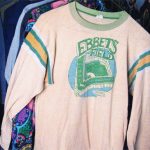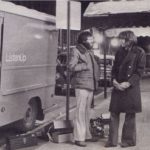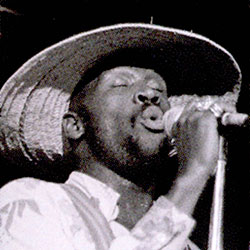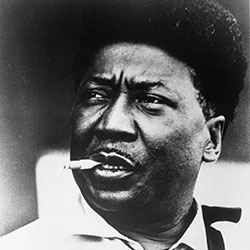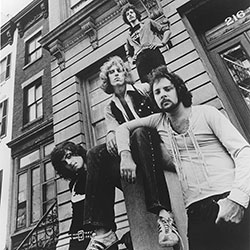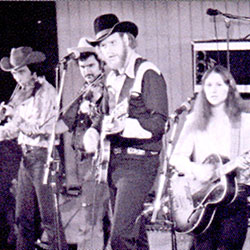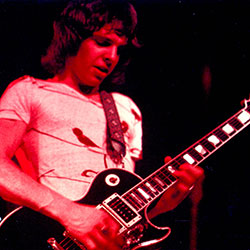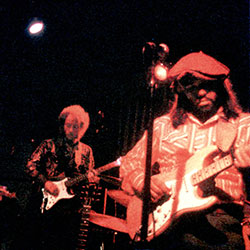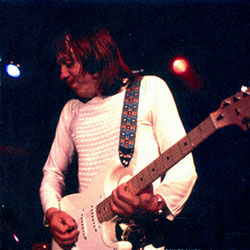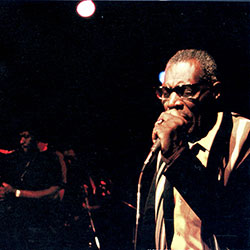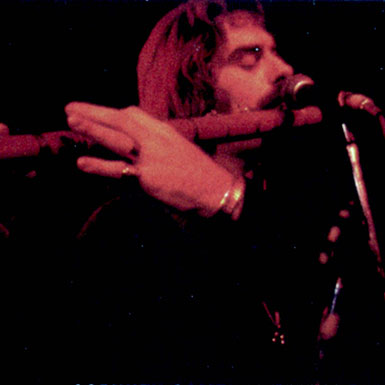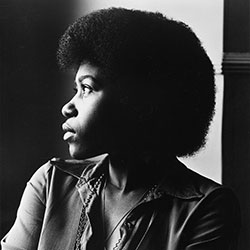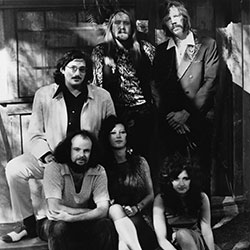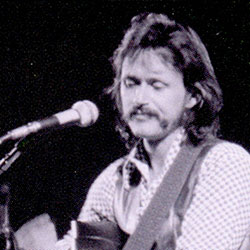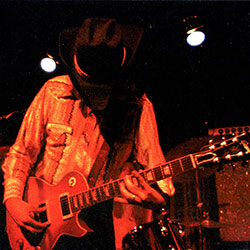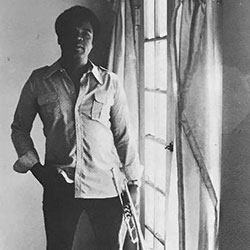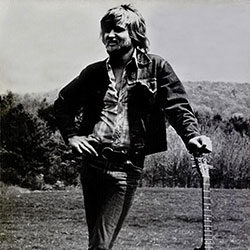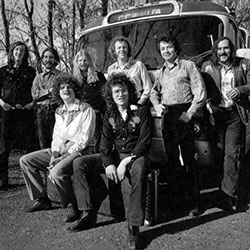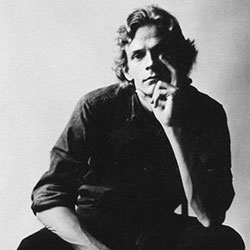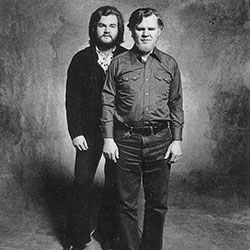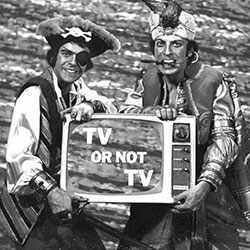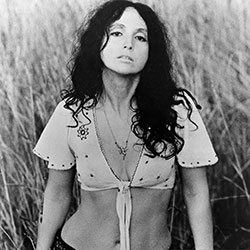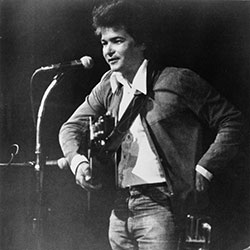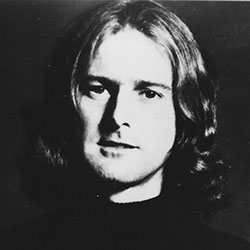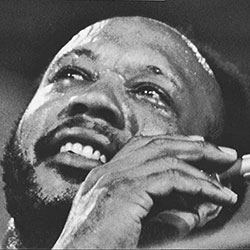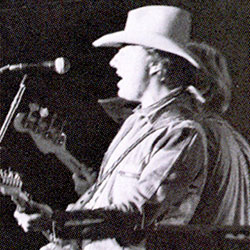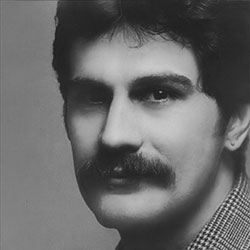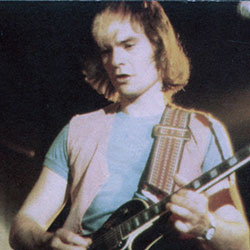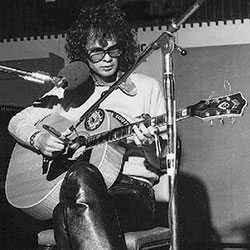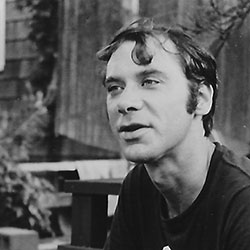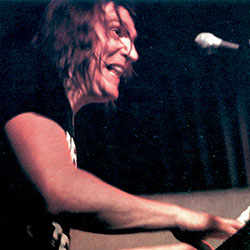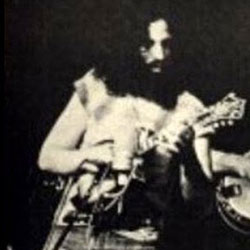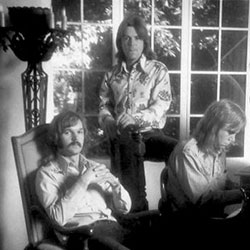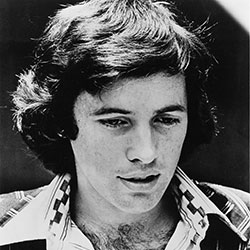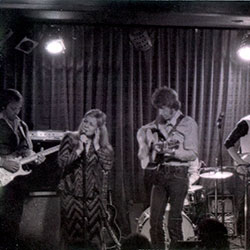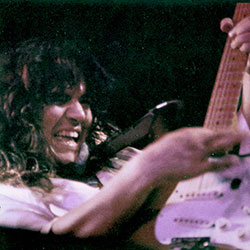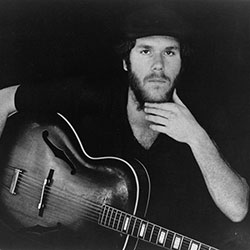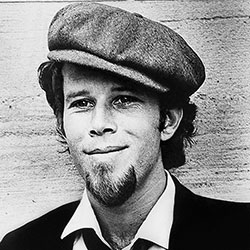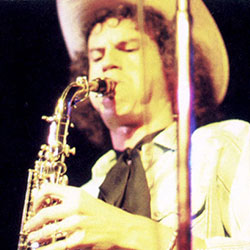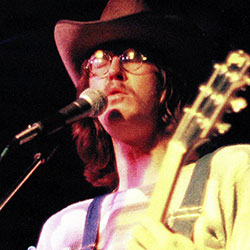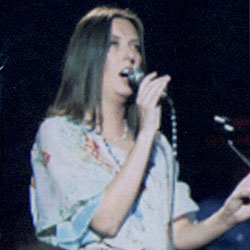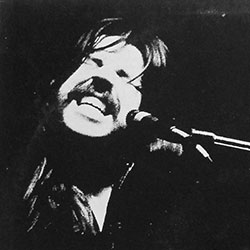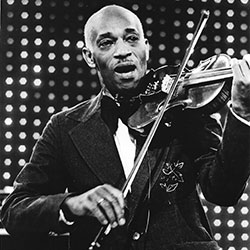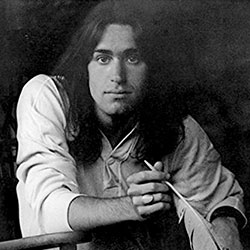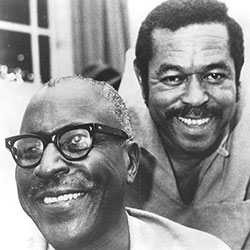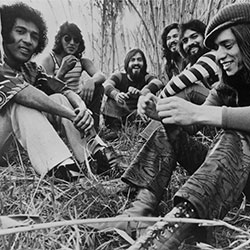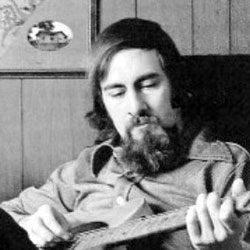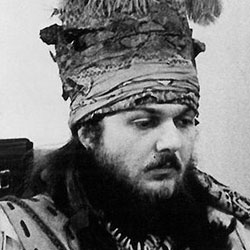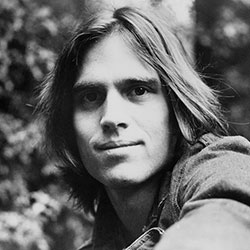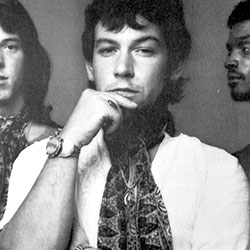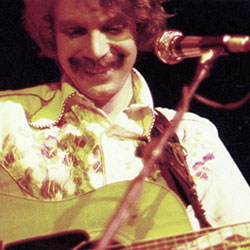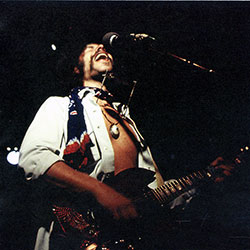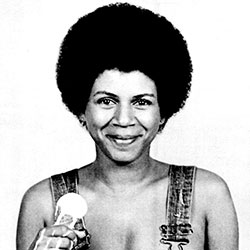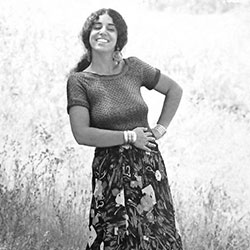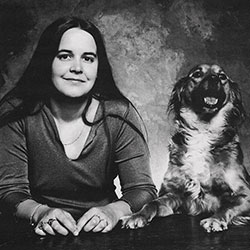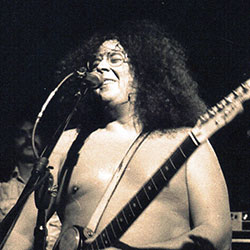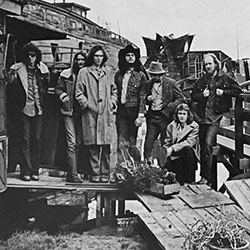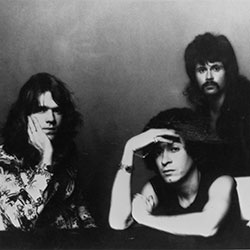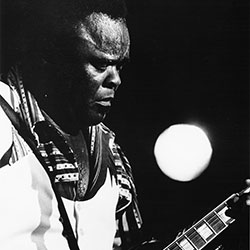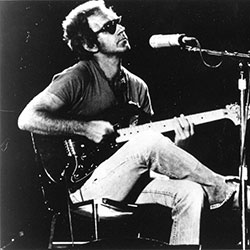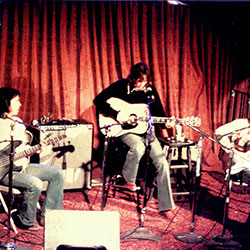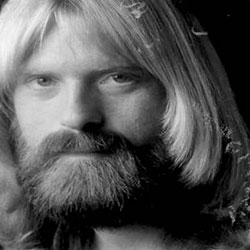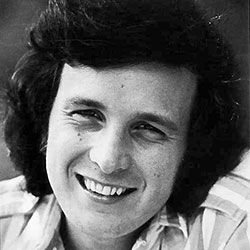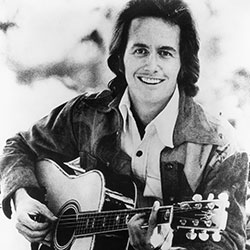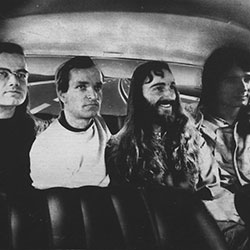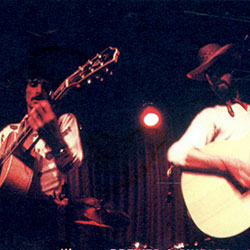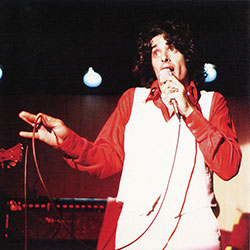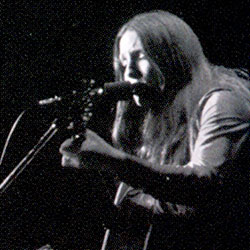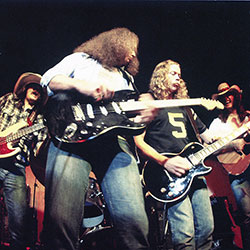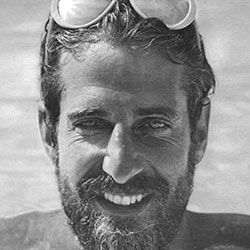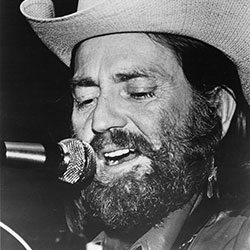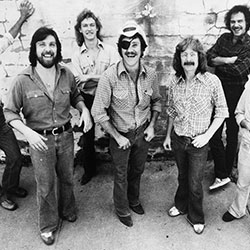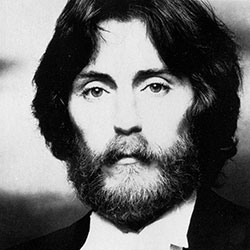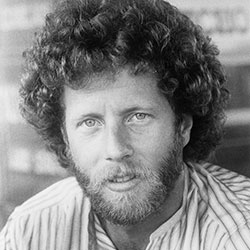Ebbets Field 1973–1977
In the early ’70s, Denver was regarded as a blip on the national music radar that didn’t rate consideration. But Ebbets Field helped change all that, becoming the city’s premier concert venue during its four-year run. The tiny club was a stopping point for nearly every up-and-comer from every genre—rock, blues and country to jazz, folk and comedy.
The live, intimate performances would be a footnote in rock history if not for the shows professionally recorded by the staff of ListenUp, the local audio/video retailer and Ebbets’ sound company. This goldmine of tracks will take listeners back a few decades, offering an eminent snapshot of the live music from that era—a thrill for both veterans of the Ebbets scene and new generations that have only learned of the legend.
Taj Mahal
Nobody's Business But My Own
05.16.1973
Taj Mahal built his early reputation as an authentic yet unique modern-day bluesman. He began to add plenty of musical adventurousness to music produced in the studio, but when he first performed at Ebbets Field, he took a straight-ahead approach to “Nobody’s Business but My Own,” a song he had famously performed at the last Big Sur Festival in 1971.
Muddy Waters
Rock Me
06.19.1973
Blues giant Muddy Waters was older by the time he played Ebbets Field, but he had his band running like a well-oiled machine. The essential “Rock Me” was among his standards played during the show. Waters was clearly tired, so B.B. King, performing down the street at the Auditorium Theatre, jammed in a blues summit and tore the house apart.
New York Rock Ensemble
A Whiter Shade of Pale
07.07.1973
With music described as “classical baroque rock,” the New York Rock & Roll Ensemble was formed by Michael Kamen and two other Juilliard students. Shortening the name to New York Rock Ensemble for its last album, Freedomburger, the band offered a cover of the Procol Harum classic dominated by oboe.
Asleep at the Wheel
Take Me Back to Tulsa
07.10.1973
In the early ’70s, Asleep at the Wheel, fronted by six-foot-seven singer and guitarist Ray Benson, was praised for preserving the classic sound of Western swing. The band’s 1973 debut album Comin’ Right at Ya featured a variety of traditional and original compositions, including a faithful recording of “Take Me Back to Tulsa,” originally by Bob Wills & the Texas Playboys.
Frampton’s Camel
The Lodger
07.16.1973
The double-album concert set Frampton Comes Alive! made him a mass market phenomenon in 1976, but before that “overnight success,” guitarist Peter Frampton formed an official touring unit dubbed Frampton’s Camel and built a following through four years of near-constant touring. At Ebbets Field, he injected some of his better songs with fiery guitar work not present on the studio versions.
Little Feat
Dixie Chicken/Tripe Face Boogie
07.19.1973
Formed by singer-songwriter, lead vocalist and guitarist Lowell George and keyboardist Bill Payne, Little Feat was incorporating New Orleans musical influences and styles into its eclectic Americana blend by the time the band toured behind Dixie Chicken, building a resolute cult following. At Ebbets, George’s funky title track segued into Payne and drummer Richie Hayward’s barnstorming “Tripe Face Boogie,” an early standard.
Robin Trower
The Fool and Me
08.06.1973
While Robin Trower helped enliven Procol Harum’s early efforts, his urgent guitar work proved a poor fit for that band’s symphonic ambitions, and he left for a solo career. Enlisting bassist/singer James Dewar and drummer Reg Isadore, Trower issued Twice Removed from Yesterday in 1973, and an Ebbets Field concert conveyed the unabated intensity that would make the power trio a stadium attraction of the mid-’70s.
Howlin’ Wolf
Killing Floor
08.23.1973
Howlin’ Wolf, the primal force of Chicago electric blues, was a very sick man by the ’70s. He rested up at his hotel for his show at Ebbets Field and was rationed by his bandleader to a half-hour onstage when he finally came out. The Wolf gave it his all, and some of the old fire still came blazing forth—a version of the defining classic “Killing Floor” particularly stood out.
Sopwith Camel
Hello, Hello
09.03.1973
With the vaudevillian “Hello, Hello” in early 1967, Sopwith Camel emerged as the first San Francisco psychedelic-era band to have a Top 40 hit. The group shared producer Erik Jacobsen with their Kama Sutra labelmates the Lovin’ Spoonful. After a move to Warner Bros., The Miraculous Hump Returns from the Moon was released in 1972. A major market tour ensued, and more records sold in Denver than any other city.
Joan Armatrading
Steppin’ Out
09.11.1973
British singer-songwriter Joan Armatrading was at the beginning of a remarkably durable, consistent career. After releasing her debut album in 1972, she ended her collaboration with lyricist Pam Nestor and wrote songs by herself, placing the emphasis on matters of the heart. Her Ebbets Field recording of “Steppin’ Out” showed a glimpse of the greatness to come.
Dan Hicks
I Scare Myself
09.13.1973
The eccentric Dan Hicks came to prominence in the emerging counter culture of mid-’60s San Francisco as drummer with the Charlatans. He then formed the Hot Licks, leading a sound of idiosyncratic hipster acoustic swing. In the glory years, the band played Ebbets Field, where Hicks was perhaps best loved for the hippie jazz of fan favorite “I Scare Myself” and his dry, witty between-song banter.
Jesse Colin Young
Ridgetop
09.30.1973
A founding member and lead singer of the ’60s folk-rock outfit the Youngbloods (“Get Together”), Jesse Colin Young’s fourth solo album, Song for Juli, was a sleeper hit in 1973, staying on the charts for almost a year. A standout track was “Ridgetop,” a song about his home and recording studio in Inverness, California (which burned down in the 1995 Mount Vision Fire).
The Marshall Tucker Band
24 Hours at a Time
10.03.1973
The Marshall Tucker Band, one of the major Southern rock ensembles of the ’70s, cooked up a stew of rock, country and jazz styles on which lead guitarist Toy Caldwell shone. The Ebbets Field concert featured a paradigm of the Spartanburg, South Carolina group’s extended instrumental sections, a nine-minute rendering of the FM radio staple “24 Hours at a Time.”
Freddie Hubbard
Uncle Albert/Admiral Halsey
10.30.1973
Trumpeter and composer Freddie Hubbard recorded groundbreaking electric jazz on Creed Taylor’s CTI label in the early ’70s. The album First Light, which won a Grammy Award for Best Jazz Performance by a Group, featured an ingenious reading of Paul & Linda McCartney’s “Uncle Albert/Admiral Halsey.”
Chip Taylor
Wild Thing
11.08.1973
Chip Taylor was feted for writing the simplistic but memorable “Wild Thing,” recorded by the Troggs, a British group that topped the charts in July 1966 with the much-covered proto-punk standard (he’s also known for his composition “Angel of the Morning,” a big one-shot pop hit for Merilee Rush). Taylor didn’t give up his ambition to be a recording artist himself, and he cut a series of eccentric country solo albums in the ’70s.
Commander Cody & His Lost Planet Airmen
Truck Drivin’ Man
11.08.1973
The irreverent George Frayne and his band, a.k.a. Commander Cody & His Lost Planet Airmen, were pioneers of “insurgent country” (basically hippie-redneck rock). Their wild Ebbets Field set reverberated with an interpretation of a big-rig musical classic, Terry Fell’s “Truck Drivin’ Man,” that predated the New Riders of the Purple Sage’s recorded cover version.
Livingston Taylor
Carolina Day
11.27.1973
Livingston Taylor’s 1970 debut album included the song “Carolina Day,” produced by Jon Landau (who would later produce Bruce Springsteen). On tour, Taylor (James’ younger brother) joined Jethro Tull at Colorado’s Red Rocks Amphtheatre, a concert resulting in a riot that convinced Denver officials to ban rock events there, a ruling that held until 1975. Taylor returned to town to perform at Ebbets Field.
Doc & Merle Watson
Wabash Cannonball
11.29.1973
Numerous stories and patter—mostly about traditional numbers like “Wabash Cannonball”—guided fans through the Ebbets Field performance by Doc & Merle Watson. A gentle bland man from Deep Gap, North Carolina, Doc had reached middle age before gaining attention as a flat-picking genius. Merle, a talent in his own right, appeared with his father regularly.
Proctor & Bergman
Channel 85 Sign-On
12.06.1973
Philip Proctor and Peter Bergman, co-founders and the Midwestern members of the fabled Firesign Theater, took some time out from the famous comedy troupe to spawn TV or Not TV, an intricate, hilarious album-length parody skewing a futuristic cable-television station. As Proctor & Bergman, the deft commentators explored the concept at Ebbets Field.
Maria Muldaur
Midnight at the Oasis
01.30.1974
Part of the American folk music revival in the early ’60s, Maria Muldaur married fellow Jim Kweskin & the Jug Band member Geoff Muldaur. After the group split up, so did the couple, but not before producing two albums. The gifted singer released her first solo album in 1973, containing the massive pop hit “Midnight at the Oasis.”
John Prine
Sam Stone
02.04.1974
John Prine came out of working-class Chicago in the early ’70s, a folk-based singer-songwriter who produced rewarding and interesting albums while confronting the label of “the new Dylan.” He’d not only worked as a letter carrier for the post office but served in the Army, so his poignant, sentimental writing reflected a cutting cynicism. “Sam Stone,” about the abuse of Vietnam vets, was prime Prine.
Roger McGuinn
Mr. Spaceman
02.04.1974
The frontman and leader of the Byrds, Roger McGuinn released his self-titled solo debut in 1973, the same year the band finally broke up. At Ebbets Field, he performed “Mr. Spaceman,” a country-tinged Byrds song he wrote that the music press described as “space rock” upon its release as a single in 1966.
Les McCann
Compared to What
02.06.1974
Jazz pianist and vocalist Les McCann reached the pop charts with “Compared to What,” a “topical rant” written by Gene McDaniels years earlier criticizing the Vietnam War. It had become McCann’s signature tune following a performance with tenor saxophonist Eddie Harris at the 1969 Montreux Jazz Festival.
Jerry Jeff Walker
L.A. Freeway
02.20.1974
Having penned an American pop standard, “Mr. Bojangles,” singer-songwriter Jerry Jeff Walker left New York for Austin in the early ’70s and reinvented himself as a Lone Star troubadour. He covered a song written by fellow Texan songsmith Guy Clark, “L.A. Freeway,” and made it a hit. Walker included the tune in a set of cowboy rock ’n’ roll at Ebbets Field.
Kenny Rankin
Blackbird
02.25.1974
After recording a singular vocal-and-guitar arrangement of the Beatles’ song “Blackbird” for his album Silver Morning, perceptive singer-songwriter Kenny Rankin was asked by Paul McCartney to perform it when he and (posthumously) John Lennon were inducted into the Songwriters Hall of Fame in 1987.
Strawbs
Out in the Cold/Round and Round
03.04.1974
English rock band Strawbs started out as a bluegrass group, but eventually transformed to progressive rock innovators on Hero and Heroine, recorded with a new lineup. Soon after Strawbs performed at Ebbets Field, drummer Richard Hudson and bassist John Ford, who had exited to form Hudson-Ford, also played Ebbets and wrote a song called “Mile High City” afterwards.
Al Kooper
The Ballad of Curtis Loew
03.11.1974
Later referred to as the “Forrest Gump of rock,” Al Kooper was known for many things, including organizing Blood, Sweat & Tears, playing the Hammond organ riff on Bob Dylan’s “Like a Rolling Stone” and producing Lynyrd Skynyrd’s first three albums. In April 2005, Kooper added instrumental elements to his Ebbets Field recording of Skynyrd’s “The Ballad of Curtis Loew.”
John Fahey
Fare Forward Voyagers
03.21.1974
An innovative, eccentric guitarist and composer, Fahey founded the Takoma Records, filtering numerous genres of music into his own finger-picking technique, expressed in lengthy instrumental improvisations. The title track of Fare Forward Voyagers comprised a complete side of the original album.
Brian Auger’s Oblivion Express
Happiness Is Just Around the Bend
04.04.1974
A British jazz-rock keyboardist, Brian Auger formed the fusion ensemble Oblivion Express to play an adventurous musical blend, and the album Closer to It entered the jazz, R&B and rock charts simultaneously. At Ebbets Field, “Happiness Is Just Around the Bend,” Auger’s best-known composition, soared on the strength of Auger’s fantastic keyboard runs.
Great American Music Band
Katy Hill
05.07.1974
Mandolin virtuoso David Grisman and violinist Richard Greene performed a number of times using the name Great American Music Band. This group never officially recorded and lasted only a short time (Jerry Garcia played banjo for a few shows during that period). At an Ebbets Field show, Grisman and Greene were joined by David Nichtern and Taj Mahal for a reading of the traditional song “Katy Hill.”
Moby Grape
Omaha
05.08.1974
One of the preeminent rock bands to emerge from San Francisco in the ’60s, Moby Grape’s achievements coincided with a long legal dispute with the group’s former manager. Three of the five original members—Peter Lewis, Jerry Miller and Bob Mosley—reformed the band in 1973 for some live shows.
Ry Cooder
Don’t Take Everybody to Be Your Friend
05.20.1974
Ry Cooder, a respected roots musician and guitarist, started a solo career in the early ’70s and released a series of albums that delved into blues, country, gospel and folk. At Ebbets Field, he even showcased calypso, performing his variation on Bahamian guitarist Joseph Spence’s “Don’t Take Everybody to Be Your Friend.” It was one of his last gigs before he withdrew from performing.
Fairport Convention
Matty Groves
05.23.1974
A British folk rock band, Fairport Convention saw numerous lineup changes around the core of fiddler Dave Swarbrick and bassist Ashley Hutchings. The lineup that performed at Ebbets in early 1974 included the recent addition of Sandy Denny, who’d returned to the band for a second time to considerable expectations. The electrified version of the traditional English folk song “Matty Groves” was an example of Fairport’s capabilities.
Tommy Bolin
Homeward Strut
06.03.1974
In June 1974, the late Tommy Bolin was still a member of the about-to-splinter James Gang, and he decided to book a couple of nights at Ebbets Field to try out some new material he’d written. He called upon his old band Energy, featuring his frequent collaborator Jeff Cook, to back him up. The instrumental “Homeward Strut” would be included on Teaser, Bolin’s debut solo album.
Loudon Wainwright III
Down Drinking at the Bar
06.19.1974
One of many folk singer-songwriters touted in the early ’70s as “the new Bob Dylan,” Loudon Wainwright III always played the witty cynic. The thinking person’s troubadour never became a full-fledged pop star, but for those in the know, he was one of America’s greatest raconteurs, poking fun at his private paranoia and neuroses. He was at his smart-aleck peak on “Down Drinkin’ at the Bar.”
Tom Waits
Martha
06.20.1974
Hunched over a bar-room piano, with a shot of rye, a bottle of beer and cigarettes at the ready, Tom Waits sang witty, sentimental stories of late-night characters. Only 24 at the time of Closing Time, his debut album, Waits imagined a scenario of an old man looking back on a youthful romance on “Martha.”
Wet Willie
Grits Ain’t Groceries/Soul Jones
06.27.1974
No band played a soulful brand of Southern rock with greater conviction than Wet Willie. The main claim to fame was “Keep On Smilin’,” a hit single that reached the Top 10 on the pop charts, but the group was more closely tied to good-time R&B tunes—with singer Jimmy Hall at the helm on the Ebbets Field stage, the members filled their set with a version of Little Milton’s “Grits Ain’t Groceries” and the funky “Soul Jones.”
Pure Prairie League
I’ll Fix Your Flat Tire, Merle
07.03.1974
With a significant personnel change (the early departure of lead singer Craig Fuller), the sound of Pure Prairie League changed considerably. Yet the country-rock band continued to prosper during the ’70s, with Larry Goshorn as the main songwriter. PPL performed at Ebbets Field in support of the Two Lane Highway album, featuring “I’ll Fix Your Flat Tire, Merle,” a humorous tribute to country music legend Merle Haggard.
Steeleye Span
Cam Ye O’er Frae France
07.07.1974
One of the earliest and most prolific bands to blend traditional British Isles folk music with a more rock-oriented approach, Steeleye Span retained a readily identifiable sound despite numerous personnel changes, built around amplified acoustic instruments and the distinctive vocals of Maddy Prior. On rare occasions at Ebbets Field, the members acted out a play as they performed musically.
Bob Seger
Sail On
07.08.1974
A locally successful Detroit-area artist, Bob Seger followed several years of striving for broader success with the 1974 release Seven, his first album to feature the players forming the Silver Bullet Band. Seven contained the single “Get Out of Denver”; “Sail On,” also written for the album, didn’t make the cut.
Papa John Creach
Playing My Music
07.31.1974
Creach was already in his fifties when he wowed the rock audience through his work with Jefferson Airplane and Hot Tuna. By 1973, the blues violinist had left to focus on his third solo album. In the studio, the biographical “Playing My Music” featured 22-year-old guitarist Kevin Moore, later known as Keb’ Mo’.
Dan Fogelberg
Stars
08.17.1974
Dan Fogelberg led a band called Fool’s Gold and toured almost constantly for two years. In the midst of it all, his manager Irving Azoff convinced him to do a couple of nights at Ebbets Field. Fogelberg instantly fell in love with the mountains, and impulsively bought Chris Hillman’s house in Nederland. When he finished the tour in 1975, Fogelberg moved to Colorado.
Sonny Terry & Brownie McGhee
My Baby Done Changed the Lock on the Door
08.27.1974
Harmonica player Terry and singer-guitarist McGhee became popular during the blues revival of the ’60s and early ’70s, playing their roots music on the concert and festival circuits. Their version of “My Baby Done Changed the Lock on the Door,” a compelling country blues, featured rousing call-and-response vocals.
El Chicano
Mas Zacate
09.05.1974
While the members were never as big as Santana, El Chicano was one of the best groups of the ’70s Latin rock explosion. The band acquired a loyal cult following and was especially popular in the Mexican-American neighborhoods of the southwestern US and Denver. At Ebbets, Chicano baby boomers found a lot to admire in the infectious “Mas Zacate.”
Roy Buchanan
Roy’s Bluz
09.13.1974
A master of the Telecaster sound, Buchanan had gained notice from an hour-long PBS television documentary; it purportedly earned the blues-rock guitarist an invitation to join the Rolling Stones, which he turned down. Pursuing his own career, the cult figure ripped on gems such as “Roy’s Bluz.”
Dr. John
Right Place, Wrong Time
09.25.1974
Growing up in New Orleans, Mac Rebennack was an active session musician until he adopted the Dr. John persona, performing in a theatrical stage show inspired by voodoo medicine shows and elaborate Mardi Gras costumes and headdress. He enjoyed a Top 10 hit single with “Right Place, Wrong Time.”
Eric Andersen
Thirsty Boots
10.04.1974
Eric Andersen hit the East Coast folk circuit in the ’60s, hyped early on as one of the first “new Dylan” successors, a daunting and somewhat deceiving label. Andersen made his mark as the resident romantic of the period, a literate songwriter and graceful singer. The social commentary of “Thirsty Boots,” recorded by Judy Collins, Bob Dylan, John Denver and others, was revisited many times at Ebbets Field.
The Eric Burdon Band
It’s My Life
10.17.1974
Previously the lead vocalist with the Animals and War, Eric Burdon launched a solo career with a self-titled group, a hard-rock incarnation pounding behind him as he reinterpreted several Animals classics, including “It’s My Life,” a musical declaration of independence that had topped the charts in 1965.
Tom Rush
No Regrets
10.22.1974
A folk-rock musician, Tom Rush helped usher in the era of the singer-songwriter. His 1968 composition “No Regrets” became an acknowledged standard, covered by several dozen artists. In addition to his 1968 sparse acoustic rendition, Rush himself later made an orchestrated version featuring an electric guitar solo in 1974, and he split the difference at Ebbets Field that year.
Spirit
Kristee/My Road
10.30.1974
Spirit forged a distinctive, diverse niche in the world of late-’60s rock. In 1974, singer, songwriter and guitarist Randy California rejoined with drummer Ed Cassidy and again performed as Spirit, at times adding bassist Mark Andes and keyboardist John Locke from the original quintet. “Kristee” and “My Road” were some of California’s new songs from this phase.
Minnie Riperton
Lovin’ You
11.05.1974
A soul singer known for her soaring five-octave range, Riperton showcased her ability to reach high notes in her whistle register on “Lovin’ You,” the song that reached No. 1 in 1975, the apex of her career. Nine months later, she was diagnosed with breast cancer; she passed away in 1979 at the age of 31.
Wendy Waldman
Mad Mad Me
11.07.1974
Singer-songwriter Wendy Waldman’s first recordings were made as a part of Bryndle, whose other members were Karla Bonoff, Andrew Gold and Kenny Edwards. When the group disbanded, she signed with Warner Bros. Records and released her first album in 1973. That same year, Maria Muldaur covered two songs written by Waldman on her self-titled first album, including “Mad Mad Me.”
Tracy Nelson
Down So Low
11.08.1974
One of the female country-gospel-blues-rock talents to emerge from the San Francisco music scene of the mid-’60s, Tracy Nelson led the outfit Mother Earth before pursuing a solo career. Her perennial “Down So Low” (recorded by everyone from Linda Ronstadt to Etta James) denoted the full-throated power that made her so popular with a large cult following. At Ebbets Field, Nelson delivered the song as a real showstopper.
Flo & Eddie
Another Pop Star’s Life
12.12.1974
Most people identify Mark Volman and Howard Kaylan, otherwise known under their moniker Flo & Eddie, as either the sweet pop voices in the Turtles of the controlled insanity behind Frank Zappa’s Mothers of Invention. Flo & Eddie were impressive singers and very funny comedians, and the eclectic duo showcased both aspects of their talent while performing at Ebbets Field.
Goose Creek Symphony
(Oh Lord Won’t You Buy Me A) Mercedes Benz
12.19.1974
An esoteric country-rock band with roots in Phoenix, Goose Creek Symphony drew comparisons to the Band and the Grateful Dead. Led by vocalist and guitarist Charles Gearhart, the group recorded three albums for a major label, the last boasting a hit single with a cover of Janis Joplin’s song “Mercedes Benz.”
Sugarloaf
Green-Eyed Lady
01.15.1975
In trying to regain a recording deal, Jerry Corbetta and Sugarloaf were spurned rather imperiously, which resulted in “Don’t Call Us, We’ll Call You,” an amusing song about the fickle music industry that peaked at No. 9 in 1975. At Ebbets Field, Colorado’s great classic rock band also performed its other big national hit, “Green-Eyed Lady,” a jazzy jam that went to No. 3 in 1970.
Freddie King
Have You Ever Loved a Woman
01.23.1975
Along with B.B. and Albert King, Freddie King was a dynamo in the ranks of blues guitarists. In the early ’70s, King secured a record contract with Leon Russell’s Shelter Records. In addition to respectable sales, his concerts were also popular with both blues and rock audiences. His Ebbets Field performance included the stunning “Have You Ever Loved a Woman.”
J.J. Cale
After Midnight
02.13.1975
The laid-back Cale was languishing in obscurity in 1970 when it came to his attention that Eric Clapton had covered his 1966 song “After Midnight.” The rendition became a huge radio hit and Cale’s producer encouraged him to take advantage of the publicity. He re-recorded the song for his 1971 album Naturally.
Gene Clark
Set You Free This Time
02.19.1975
Few discourses about the Byrds mention Gene Clark, a founding member of the first American supergroup and one of the sturdiest vocal presences in rock history. Performing at Ebbets Field in 1975, it was evident Clark never stopped trying to begin anew. The gig offered a captivating variety of tunes, even “Set You Free This Time” from his Byrds days.
Michael Murphey
You Can Only Say So Much
02.26.1975
Michael Murphey played a pivotal role in founding the progressive “cosmic cowboy” or “outlaw country” genre. In 1973, he pursued a more ambitious musical vision, signing to Epic Records and releasing Michael Murphey, a Bob Johnston-produced album that included “You Can Only Say So Much.”
Don McLean
Wonderful Baby
04.14.1975
Best known for his 1971 magnum opus “American Pie,” an eight-minute-plus “cultural touchstone” about the rock ’n’ roll generation’s loss of innocence, McLean scored another hit single with “Wonderful Baby,” a 1930s-styled tribute to Fred Astaire (who also recorded it) that topped the easy listening charts.
John Stewart
Lady and the Outlaw
04.23.1975
John Stewart’ was known for his contribution to the folk music movement in the early ’60s with the Kingston Trio; big royalty checks from the Monkees and Anne Murray for writing “Daydream Believer,” and a slew of critically acclaimed albums in the early ’70s filed under “folk,” “country,” “folk rock” or “pop” in record stores. “Lady and the Outlaw” was Stewart’s nod to the outlaw movement that was happening in Austin.
Kraftwerk
Autobahn
05.20.1975
The German pioneers of electronic music, Kraftwerk developed a self-described “robot pop” style on albums such as Autobahn, and the hypnotic pulse of the title track, inspired by the joy of driving on Germany’s autobahns, became an international hit. A tour took the group to the US for the first time.
Brewer & Shipley
Witchi-Tai-To”
05.25.1975
Witchi-Tai-To” was derived by saxophonist and composer Jim Pepper from an authentic peyote chant that he learned from his Native American grandfather. Brewer & Shipley heard the version by Pepper’s group, Everything Is Everything, on a cult radio station. The folk-rock duo’s version of the song received a lot of FM radio airplay and, in certain circles (Denver’s freeform station KFML), was the more well-regarded version.
The Beau Brummels
You Tell Me Why
06.12.1975
The Beau Brummels had two big hits in mid-’60s rock, “Laugh Laugh” and “Just a Little,” both penned by guitarist Ron Elliott. The fine ballad “You Tell Me Why,” the Brummels’ only other Top 40 single, was the lone remake of their older material to appear on their self-titled 1975 reunion album. At Ebbets Field, Sal Valentino’s relaxed vocal was one of the song’s great features.
Katy Moffatt
Ninety Miles an Hour (Down a Dead End Street)
06.19.1975
A fixture in the Denver folk music scene, Katy Moffatt’s frequent gigs at Ebbets Field opened a door to the recording industry—CBS Records A&R vice-president Billy Sherrill, who had produced more than a hundred gold records, signed Moffatt to a multi-record deal in 1975, bringing her to Nashville to personally supervise the recording of her first album, entitled Katy.
Outlaws
Green Grass & High Tides
07.23.1975
A major part of the Southern rock explosion following Lynyrd Skynyrd and the Marshall Tucker Band, the Outlaws earned a formidable reputation as an incendiary live act. The extended jam “Green Grass and High Tides,” the final track on the band’s self-titled debut album, became the best representation of their distinctive triple lead-guitar attack, performed at Ebbets Field on the first national tour.
Jimmie Spheeris
The Original Tap Dancing Kid
09.22.1975
An underappreciated, introspective singer-songwriter whose poetic and vulnerable writing garnered a rabid cult following and FM radio airplay, Spheeris followed his second album, 1973’s The Original Tap Dancing Kid (produced by Felix Cavaliere, the lead singer of the Rascals), with a period of extensive touring.
Willie Nelson
Denver/O’er the Waves/Down Yonder
09.27.1975
During his long return drive to Austin, Texas, after a ski trip to Steamboat Springs, Colorado, Willie Nelson was inspired to write a Western concept album. The critical and commercial success of Red Headed Stranger made him one of the main figures in outlaw country music. In the song “Denver,” the character—a wayward preacher on the run—falls in love with a woman in a dance hall.
Dr. Hook
Only Sixteen
01.13.1976
College kids, couples, cowboys and bikers could all manage to have a good time at a Dr. Hook show—the group engaged audiences with demented live antics, which ranged from bizarre repartee to imitating the opening act. A reworked version of Sam Cooke’s “Only Sixteen” revitalized the band’s career, charting in the Top 10 on the strength of Dennis Locorriere’s ingenuous lead vocal.
J.D. Souther
Faithless Love
07.02.1976
John David Souther was connected with some of the bigger pop names of the Southern California country-rock sound of the ’70s. His writing provided material for both the Eagles and one-time lover Linda Ronstadt, whose Heart Like a Wheel album featured his song “Faithless Love.” Souther also released a critically acclaimed succession of solo albums.
Chris Hillman
Follow Me Through
08.25.1976
Through his seminal work with the Byrds and the Flying Burrito Brothers, Chris Hillman figured in the development of the country-rock genre. Trouble in Paradise, the Souther-Hillman-Furay Band’s second release, included Hillman’s selection “Follow Me Through.” A few months after the breakup of that band, Hillman hit Ebbets Field with a backing group that included Firefall’s Jock Bartley, Mark Andes and Rick Roberts.

